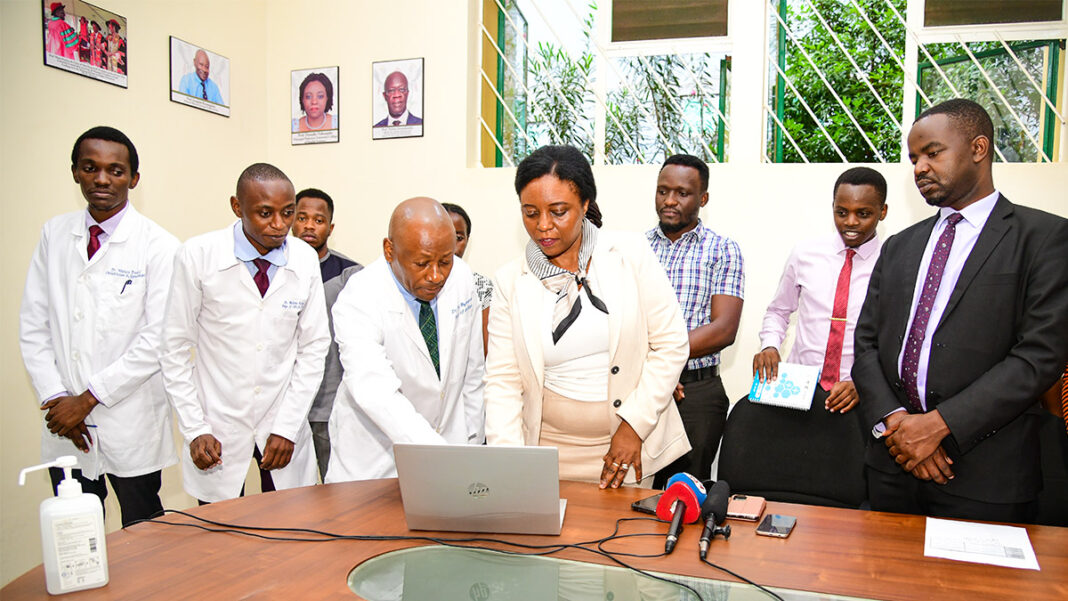Makerere University students, staff and the general public will have easy and free access to Reproductive Tract Infection (RTI) health services courtesy of a new mobile application developed by Makerere University Hospital.
The Mak RTI mobile App launched on Friday, May 3 can be downloaded free of charge from the Google Play Store. The App enables users to learn more about reproductive tract infections, chat with the health care providers, book an appointment with a doctor as well as access other health services.
Makerere University Hospital has also established the RTI Information Centre dedicated to addressing matters about reproductive tract infections among Ugandans. To supplement the RTI App, Mak Hospital has established an RTI clinic which will be open every Monday to provide services to those in need.
In Uganda, a number of people from the age of 15 to 49 years suffer from Reproductive Tract Infections (RTIs). RTIs are defined as infections of the genital organs and include Sexually Transmitted Infections (STIs), endogenous infections and iatrogenic infections.
Endogenous infections such as vaginal candidiasis and bacterial vaginosis are not sexually transmitted and can occur among people who have never had a sexual relationship. On the other hand, iatrogenic infections are caused by organisms introduced into the genital tract while doing improper medical procedures for instance unsafe abortions. Research at all levels indicates that if left untreated, RTIs are harmful to a person’s body and can lead to complications some of which may manifest later in life.
According to Prof. Josaphat Byamugisha, Director of Makerere University Hospital and the Principal Investigator of this research project, some of the symptoms of RTIs such as itching in the private body parts and/or experiencing pain when urinating, and/or severe pain during one’s menstrual cycle seem minor, but once left untreated, they advance into health complications such as blocking the fallopian tubes, affecting the ovary and womb, infertility among women, failure of the urinary system and in some cases cancer.
Prof. Byamugisha revealed that the Mak RTI App was developed to address the information gap on RTIs among the community. He observed that some Ugandans (15-49 years), do not have access to the right information about RTIs while others fear to talk about these types of infections because they affect reproductive organs or private body parts.
He also mentioned the stigma associated with such diseases for instance referring to them as Sexually Transmitted Diseases (STDs) or Sexually Transmitted Infections (STIs), and yet some of them even attack young people who have never had sexual relations. For example, Syphilis can be transmitted from the mother to the unborn child. Prof. Byamugisha pointed out that to avoid the stigmatization, such infections are better classified as Reproductive Tract Infections (RTIs).
To address the information gap on RTIs, the Principal Investigator Prof. Byamugisha together with a team of researchers from other disciplines at Makerere University wrote a concept which they submitted to the Makerere University Research and Innovations Fund (Mak-RIF) funded by the Government of Uganda. Upon receipt of the funding, the research project team embarked on the development of the Mak RTI App and Mak RTI Information Centre.
The Project Research team consists of Prof. Josaphat Byamugisha, Prof. Sarah Ssali, Dr. Edith Nakku Joloba, Rogers Kamulegeya, Ms. Ritah Namisango, Dr. Solomon Aleper, Dr. David Christopher Mukasa and Dr. Hassan Mulema.
“We developed the app mainly to help the public access information about these infections. We feel this information should reach many people and that is why we found it wise to have the Mak RTIs Information Centre,’’ the Principal Investigator said.
Prof. Byamugisha emphasized the need for individuals to seek medical care and treatment as soon as any symptom related to RTIs is detected. He thanked the Directorate for ICT Support (DICTS) led by Mr. Samuel Paul Mugabi for playing a central role in the development of the Mak RIT App.
The Mak RTI Information Centre and Mobile App were officially launched by the Deputy Vice Chancellor (Academic Affairs)-DVCAA, Prof. Umar Kakumba represented by the Principal of the College of Health Sciences (CHS), Prof. Damalie Nakanjako.
The DVCAA commended the Director, Makerere University Hospital for bringing on board a multi-disciplinary research team to address the information gap on RTIs and health services in general. He also applauded the University Hospital for continuously coming up with health products and innovations in line with the University’s digitalization agenda.
He underscored that the Mak RTI App and Mak RTI Information Centre would enable students, staff and the public to access the right information on RTIs and health services in general from any part of the country.
“As I launch the Mak RTI Information Centre and Mak RTI App, I am pleased to note that most disciplines such as health, social sciences, gender, communication and the media have participated in the processes leading to this research output. Matters of health should not be left to the doctors alone. Health should be a matter of concern for all of us. We can never have perfect health if we do not collaborate and bring different teams together,” said the Principal.
Prof. Nakanjako said the College of Health Sciences takes the lead in the utilisation of government funds to support research and innovation at Makerere University. She congratulated the Mak Hospital, which is under the College of Health Sciences, for conducting the research and coming up with the Mak RTI App.
She further highlighted that the College of Health Sciences exists to provide transformative education and research to meet societal needs.
“Research is mainly to solve problems in the community, therefore, the Mak RTI App and Information Centre is an example of research that supports the community,” she elaborated. She appreciated the Ministry of Health for continually working with the College of Health Sciences to advance research in Uganda and beyond.
On behalf of the Ministry of Health, Dr. Richard Mugahi, Assistant Commissioner Reproductive and Infant Health, applauded the Makerere University Hospital, the research team and DICTS for developing the Mak RTI App.
“In this digital era, this is what is expected. The young people are more digitally oriented. I also commend the shift from the term STI (Sexually Transmitted Infections) to RTI (Reproductive Tract Infections),” he said.
Dr. Mugahi expressed the readiness of the Ministry of Health to integrate the Mak RTI App into its digital products and services. He indicated that the Ministry of Health already has a hotline, and this would be linked with the University Hospital RTI App.
Ritah Namisango, the principal public relations officer and a member of the research team, re-affirmed that the Mak RTI App presents a convenient and user-friendly approach for students, staff and general hospital to access health services at the University Hospital. She urged all attendees to share information about the Mak RTI app widely so that it can reach everyone in need of RTI services.
On behalf of DICTS, Juma Katongole, the Principal Information Systems Administrator, said that the development of the Mak RTI App is anchored in the DICTS mandate of working with the different units at the University to optimize and automate all university business processes/services.
Katongole also assured the student leaders who attended the launch that the information received through the Mak RTI App will be treated with confidentiality and accessed by only the University Medical Team with the mandate to attend to students, staff and the public in general.
Responding to questions from student leaders from the respective Colleges and Halls of Residence, the Mak RTI Project Coordinator Dr. Hassan Mulema emphasized that the App is very secure and as such, users should not be worried about any information leakages.
The medical team at Makerere University Hospital will continue to uphold matters of privacy, confidentiality and the ethical standards that govern the medical profession when using the Mak RTI App to provide services to students, staff and the general public.
The Mak Students’ Guild who attended the launch appreciated the University Hospital for coming up with the Mak RTI App, which is bringing health services closer to the people. The student leaders pledged to popularize the Mak RTI App to the University community.
The Mak RTI App is a one-stop center for reproductive tract infection and other health services available at Makerere University hospital. The app enables users easily talk to medical officers for any services they may be in need of.


